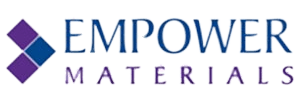Updated December 2020
Empower Materials Inc. is the producer of QPAC®, the world's cleanest thermally decomposable organic binder. QPAC® cleanly decomposes into CO2 and water in many types of atmospheres and leaves virtually no residue. This property contributes to QPAC®'s widespread usage in many demanding applications.
.jpg)
Image Credits: shutterstock.com/Pixel B
QPAC® poly(alkylene carbonate) copolymers are a unique family of innovative thermoplastics representing a true break-through in polymer technology. While traditional plastics have been primarily petroleum-based, these materials are derived from carbon dioxide and are produced through the copolymerization of CO2 with one or more epoxides. The resultant polymers are amorphous, clear, readily processible, and have long-term mechanical stability. They are also environmentally friendly by consuming 50% fewer petrochemicals, as compared to other polymers which are 100% petrochemical-based. In addition, they may exhibit biodegradable properties consistent with an environmentally friendly binder.
QPAC® 25, polyethylene carbonate, and QPAC® 40, polypropylene carbonate, are the two most widely used products within our family of binders. However, there is a wide range of QPAC® polymers possible by varying the epoxide monomer or using blends of epoxides to produce a specific reaction. Our technical group has the expertise to effectively work with you to develop the appropriate product for your application.
Production Capabilities of Empower Materials
Empower Materials is the world's only commercial manufacturer of polyalkylene carbonates. Empower Materials can make large quantities (1000's kgs) of QPAC® 25, polyethylene carbonate, QPAC® 40, polypropylene carbonate, and QPAC® 100- a terpolymer of polypropylene carbonate and polycyclohexene carbonate.
Additionally, a wide range of other QPAC® polymers is possible via the substitution of oxiranes (epoxides) using the same production equipment configuration. In addition to QPAC® 25, QPAC® 40, and QPAC® 100 (polypropylene carbonate, polyethylene carbonate, and polypropylene carbonate/polycyclohexene, respectively). The following have been successfully synthesized on pilot scale equipment:
QPAC® 60 (poly-butylene-carbonate) and QPAC® 130 (poly-cyclohexene carbonate)
Empower Materials also has the technology to modify the polymer's molecular weight across a very broad range.
Biodegradable Plastics Polymers - QPAC Polyalkylene Carbonate Sacrificial Binders
Empower Materials is a materials company making a family of high performance, biodegradable plastics polymers used primarily as sacrificial binders. These sacrificial binders called QPAC are used in many highly technical applications.
Applications of QPAC Polyalkylene Carbonate Organic Binders
Empower Materials makes a family of QPAC polyalkylene carbonates that degrade completely and uniformly into environmentally benign products making it excellent for high performance applications including low temperature glass paste applications.
QPAC Plastic Polymers in Low-Temperature Glass Paste Applications
QPAC polypropylene carbonate and polyethylene carbonate both decompose at temperatures significantly lower than other conventional binders. Additionally, the residual carbon level is significantly lower. Both these properties are highly beneficial in low-temperature glass paste applications. The QPAC sacrificial binder is added to a paste composition comprising a solvent and at least one low-temperature glass frit. The sacrificial binder provides a route for preparing a paste with excellent homogeneity, low debind and sintering temperature, low impurity levels, and customizable physical features.
Viscosity Properties of QPAC Organic Binders
QPAC also provides excellent viscosity properties to the paste formulation for deposition. These paste compositions for forming ceramic composites can be directly written or otherwise deposited by a miniaturized pen and subsequently processed into solid-state materials.
QPAC Organic Binders in LED and OLED Applications
Additionally, QPAC can be used as a sealing glass binder in low temperature sealing glass applications in which a low-temperature glass is used to seal two other glass substrates. One of the main applications for QPAC in this area is OLED and LED displays.

This information has been sourced, reviewed and adapted from materials provided by Empower Materials.
For more information on this source, please visit Empower Materials.